Contents
Labor accuses Coalition of budget blowout on business register reform

Josh Butler
The assistant treasurer, Stephen Jones, has accused the former Coalition government of presiding over a $1bn cost blowout in plans to update a key government register.
The Australian Business Register, which is meant to reduce administrative burden on business in complying with government regulation, is undergoing a reform process to update outdated technology, including combining 30 databases into one central platform. On Tuesday, Jones said the process – which had been budgeted at $500m by the former government – had blown out to $1.5bn.
Jones claimed the former government had significantly underprovisioned funds for the reform.
They had known for at least a year now there was going to be significant cost overruns.
We’ve got to get the job done, but we’re going to have to find some ways to bring the cost in.
In warning of dire economic circumstances facing Australia, the new Labor government has claimed their predecessors left behind significant budget issues, with the finance minister, Katy Gallagher, and the treasurer, Jim Chalmers, saying their departments are conducting a “line by line” audit of Coalition spending.
Key events
The NSW treasurer, Matt Kean, has weighed in to the ongoing furore surrounding Manly players in the NRL refusing to wear a pride jersey.
Someone tell those seven Manly 🦅 players the 🌈 isn’t contagious, but wearing it might make them better for showing #pride and #respect for different people. If there’s a #nrlpride round next year, I hope the mighty dragons 🐉 go red, white and rainbow!
— Matt Kean MP (@Matt_KeanMP) July 26, 2022
An incredible feat of web logging as always, Amy Remeikis. Onwards!
Nino Bucci stands ready to take you through to the early evening.
There are first speeches and a little bit more business to get through – we will also cover off the main events early tomorrow morning when the first official sitting day gets underway.
Mike Bowers is still out and about with his cameras at the ready, and Paul Karp, Josh Butler, Katharine Murphy and Tory Shepherd are all still at their keyboards filing on the day’s events. Blake Sharp-Wiggins and Rafqa Touma, our special guests from the Guardian brains trust, are also still working away. So make sure you check back to see what they are up to.
A very big thank you to everyone who has followed along with me today – it is an absolute honour to helm Politics Blog and the best part about it is all of you. So thank you. Make sure you get a rest and some switch off time (after 7.30) and I will see you back here in just over 14 hours.
Take care of you.
Just on that, Jim Chalmers will provide an economic update to parliament on Thursday.
He has been previewing that for some time – he and Katy Gallagher have spent the time since being sworn in going through the government accounts and information from Treasury and the departments on how much has been spent and where, and what the actual state of the budget is.
Labor accuses Coalition of budget blowout on business register reform

Josh Butler
The assistant treasurer, Stephen Jones, has accused the former Coalition government of presiding over a $1bn cost blowout in plans to update a key government register.
The Australian Business Register, which is meant to reduce administrative burden on business in complying with government regulation, is undergoing a reform process to update outdated technology, including combining 30 databases into one central platform. On Tuesday, Jones said the process – which had been budgeted at $500m by the former government – had blown out to $1.5bn.
Jones claimed the former government had significantly underprovisioned funds for the reform.
They had known for at least a year now there was going to be significant cost overruns.
We’ve got to get the job done, but we’re going to have to find some ways to bring the cost in.
In warning of dire economic circumstances facing Australia, the new Labor government has claimed their predecessors left behind significant budget issues, with the finance minister, Katy Gallagher, and the treasurer, Jim Chalmers, saying their departments are conducting a “line by line” audit of Coalition spending.
Anthony Albanese will be the guest on ABC’s 7.30 tonight.
Newmarch House inquest hears of lax covid rule enforcement
Dipping outside of politics for the moment, for this update on the inquest into the Newmarch House covid outbreak in 2020, from AAP.
Nurses were lax in enforcing isolation rules and left concerned families in the dark during a Covid-19 outbreak at Newmarch House early in the pandemic, a New South Wales coroner has heard.
Nineteen residents died at the western Sydney aged care home in April and May 2020 amid what was, at the time, one of the biggest outbreaks of the pandemic.
As an inquest into the deaths continues in Lidcombe coroners court, Mary Van Put gave evidence that her father, Barry Jehan, had been allowed out in the home’s common areas despite being in lockdown.
Jehan died on 28 April 2020 at the age of 93 soon after performing the rosary with one of the Newmarch nurses and five days after he tested positive. He was one of four residents who died that day.
On 20 April, Jehan took a call where he was spotted sitting outside his room at a time when the home was meant to be in lockdown.
“Is he allowed out of the room now?” Van Put’s sister asked. “Not really but no one’s here,” a nurse replied, the inquest heard on Tuesday.
Van Put said this call raised concerns about the risk of infection this posed to her father who, at the time, had tested negative for Covid.
She felt angry because he was not getting the best care available, she said. At that point early in the pandemic, it was not known whether the virus could have been transmitted through surfaces such as the soft furnishings her father was sitting on.
Before her father tested positive, Van Put said she had tried unsuccessfully to get him out of the facility but received conflicting information about the public health orders in place or orders that could be imposed by Newmarch itself.
During the outbreak, the Anglicare-run home implemented the “hospital in the home” program in which residents were treated onsite rather than being transferred to nearby hospitals.
The inquest continues.
The house is adjourned until 5pm when the first of the first speeches will begin.
Tomorrow we will get the first question time – and the first real test of how “respectful” this parliament will actually be.
From Mike Bowers’ lenses to your eyeballs:
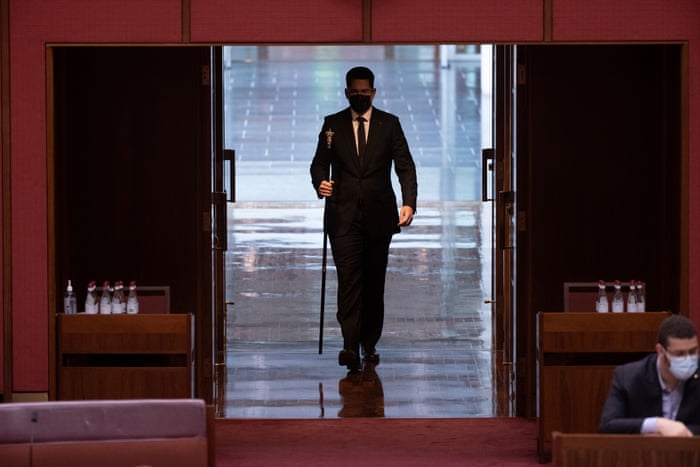
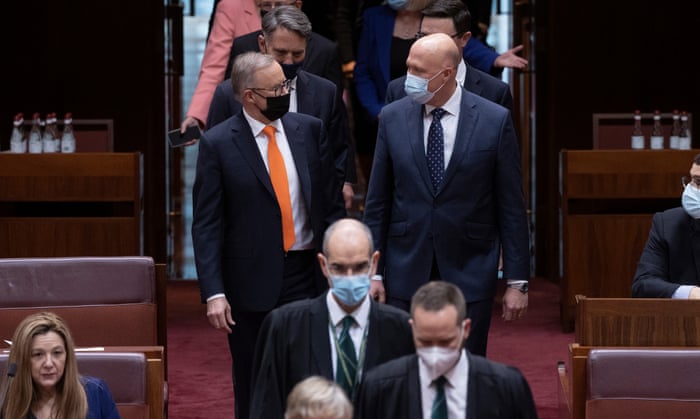
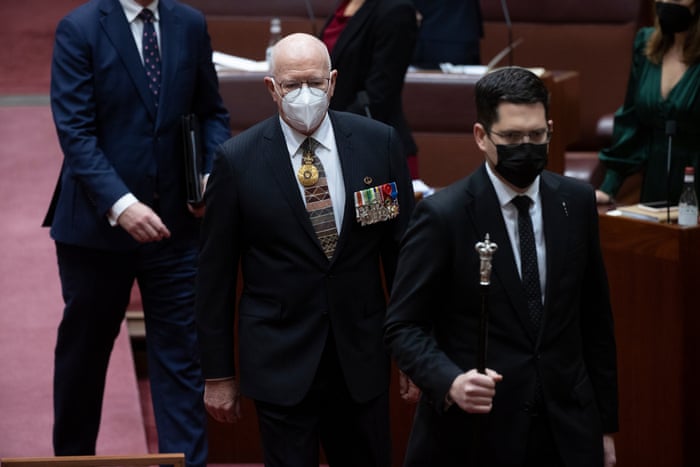
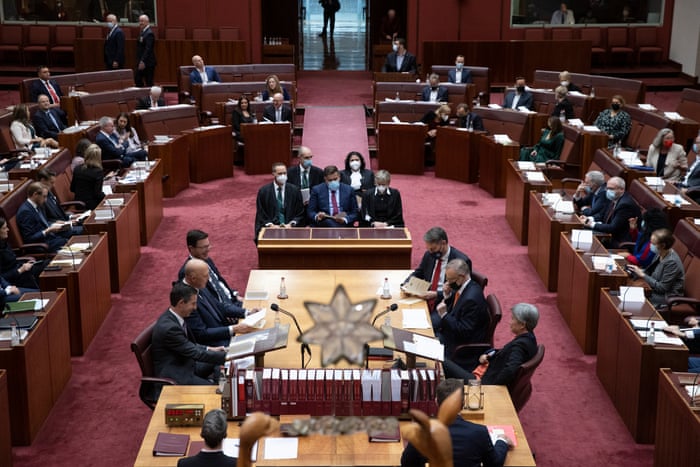
I asked the question in the blog a little while ago – has anyone seen Barnaby Joyce and a reader has responded – the former deputy prime minister was spotted on a flight to Tamworth yesterday.
He has been granted leave, from what I understand.
Tomorrow Movement protesters gathered on the lawn outside Parliament House to demand the new Labor government commit to more ambitious climate action that matches the scale of the climate and jobs crisis – as well as inside the building.
This isn’t an issue which will be going away anytime soon.
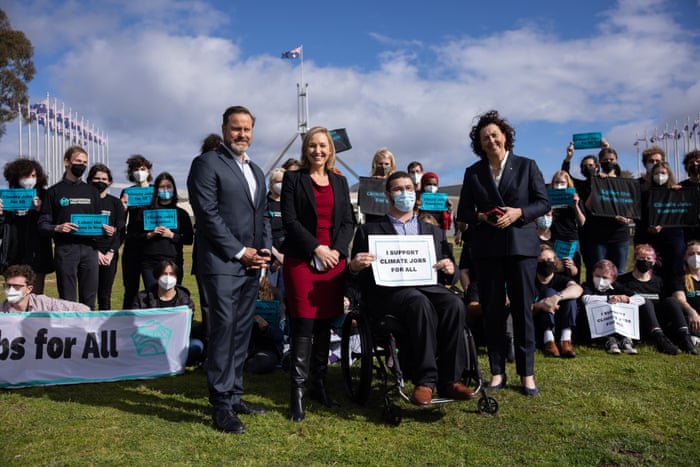
And of course, there was also pomp (after the police made sure the protesters were not in the way).
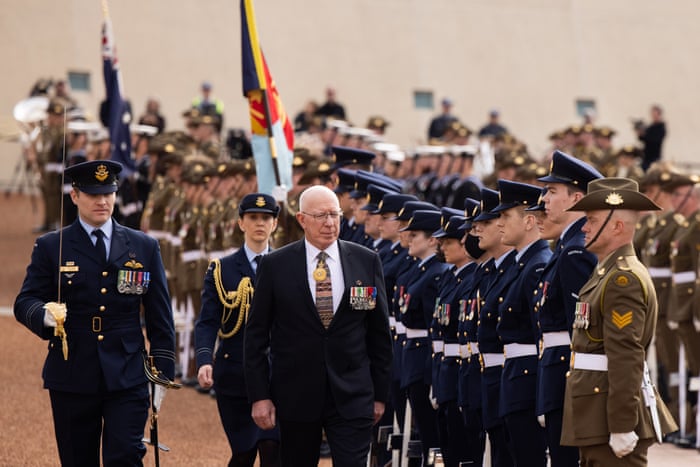
David Hurley declares the parliament officially open
The guns are sounded.
And now they go have afternoon tea (I am not joking, it is part of the schedule).
David Hurley concludes the (government) speech with:
A change of government represents a chance to bring the nation together anew.
To members and senators from the government, opposition and crossbench, I congratulate you on being called to serve our country and our democracy.
I urge you to advocate thoughtfully, debate respectfully and — in everything you do — prove worthy of the Australian people.
I wish you every success in meeting this moment.
It is now my duty and my honour, to declare the 47th parliament of the commonwealth of Australia open.
David Hurley is wrapping up here with a tip of the hat to the public service:
Leading with integrity also means working in partnership with a strong, committed and empowered public service.
The removal of the Average Staffing level cap, rebalancing the use of labour hire, limiting fixed-term contracts, and undertaking a strategic reinvestment of funds will form the first phase of the government’s plan to rebuild the public service’s capacity to deliver the best outcomes for the Australian people.
The government will ensure the APS becomes a model employer and an employer of choice, including — and especially — for First Nations people, and those living with disability.
The government will seek to lead by example.
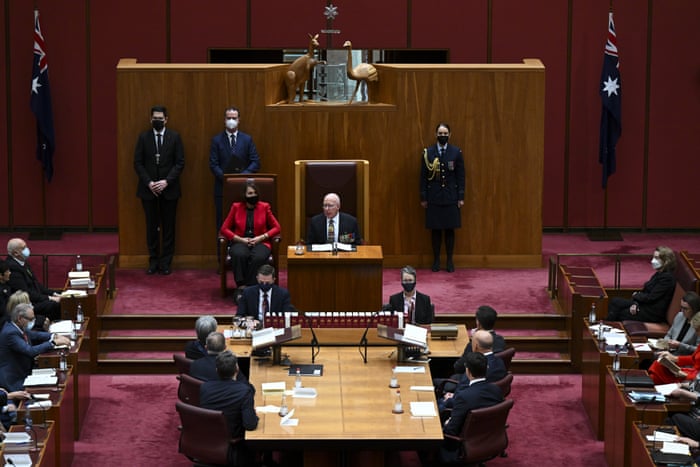
David Hurley:
The government has great faith in our national cultural endeavour, and recognises the importance of getting Australia’s arts industry back on track, too.
The conviction is simple: that a nation that invests in art and creativity is a nation that knows itself, and invites the world to know us better.
It’s in this spirit that this parliamentary term will see the release of a national cultural policy — the first in almost a decade.
There will also be greater certainty for two other vital cultural institutions — the ABC and SBS — with new funding terms spanning five years.
Hurley on fighting corruption:
The government has an ambitious agenda for Australia.
And it recognises that so much of what it hopes to achieve depends upon the trust of the Australian people.
Trust that government and public institutions will act with integrity in the interests of the nation.
To strengthen this trust, the government will legislate to create a powerful, independent and transparent National Anti-Corruption Commission.
This will bring the commonwealth in line with the states and territories, and will enable investigations of serious and systemic corruption.
It will be an important addition to the integrity framework of this country.
And out of the same commitment to accountability and public confidence, the government will establish a royal commission into the scheme commonly known as Robodebt.
David Hurley moves on to housing:
Alongside the government’s commitment to nation-building sits a determination to ensure more Australians can count on the safety and stability of secure housing.
We all know the difference a secure roof over your head can make to a person’s life chances.
The government will establish a Housing Australia Future Fund to build an additional 30,000 new social and affordable houses within five years.
It will create a National Housing Supply and Affordability Council, and launch a National Housing and Homelessness Plan.
The government also sees the importance of home ownership, the sense of belonging and pride and stability it can confer.
And so, it will support more Australians into their own home through the Help to Buy Scheme and the Regional First Home Buyer Support Scheme.
Education:
The government believes education is the most powerful weapon against disadvantage — and the best investment in Australia’s economic future.
Cheaper childcare means more children will get access to early years education.
And the government will co-operate with the states and territories to make sure all schools are put on a path to full and fair funding.
The government knows great teachers change lives — and will initiate policies to attract the best and brightest to the teaching profession and work with schools across jurisdictions to address teacher workforce challenges.
In addition, the government will prioritise helping kids bounce back after Covid-19, with a $200m investment in mental health and wellbeing support.
The government will boost investment in public Tafe and apprenticeships, to ensure a new generation of Australians can gain the skills and confidence for the jobs of the future.
And resetting the relationship with universities is a priority, too.
The government has pledged to develop an Australian Universities Accord, covering the accessibility, affordability, quality and sustainability of our treasured higher education institutions.
With that, comes a renewed focus on university and research excellence, including the translation and commercialisation of great Australian ingenuity.




